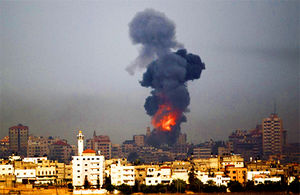2014 González Isle Conflict
| This page is a work in progress by its author(s) and should not be considered final. |
| 2014 González Isle Conflict | |||||||
|---|---|---|---|---|---|---|---|
| Part of González Archipelago Dispute | |||||||
 Aftermath of an airstrike carried out by Narsora on the capital of González Isle City, captured by a news crew on September 28th. |
|||||||
|
|||||||
| Belligerents | |||||||
| Commanders and leaders | |||||||
| Units involved | |||||||
| Narsoran National Air Force | Torisakian Armed Forces | ||||||
| Strength | |||||||
| Various | Various | ||||||
| Casualties and losses | |||||||
| 2 UAV drones 1 F-16E | Unknown number of SAM's & other equipment | ||||||
| 35+ civillians killed (Torisakian Claim) | |||||||
The 2014 González Isle Conflict also called Operation Naranja Lluvia (Orange Rain) by narsora is a conflict that erupted in late-2014, to force the torisakian government to surrender the González Isle island chain.
Background
Tensions between the countries of Narsora and Torisakia have been strained for several decades over the disputed González Archipelago. In 1973 the Torisakian military annexed the island, a move which was claimed by many as an outright invasion and occupation of Narsoran territory. Since then tensions have remained high between the two countries and several skirmishes have taken place over the islands.
Airstrikes
Narsoran military airstrikes began early morning on September 27th, 2014. The strikes were conducted against torisakian military targets, in order to force the Torisakians to surrender the island. As full-scale conflict was feared imminent, international pressure was able to convince narsoran leaders to cease the strikes and abandon the conflict.
Aftermath
The Torisakian Armed Forces increased military security and air defenses around the islands. The narsoran government were heavily criticized, as many thought of the Operation as an unprovoked attack. As of April 2015 the administration of Narsoran President Sandalio Espina is attempting a peaceful compromise to the dispute with Torisakian government.
Diciembre Trials
In October 2015, Chief the Air Force Moisés Oquendo and former president Adelina Aylen were arrested for human rights violations for their part in the operation which killed over 35 civilians. Oquendo was relieved of his position for ordering his personnel to intentionally target civilians; he is charged with Murder, "Disobeying lawful commands" and "Making false records". Aylen is charged with Murder and war crimes; both trials began in December 2015 and lasted until January 2016. During his trial, Oquendo admitted that he and Aylen ordered the Operation and did not obtain permission from the National Congress (which is required to use the military in any capacity). Both Oquendo and Aylen were sentenced to life imprisonment for their roles in the Operation. Despite this, most of both the Torisakian and Narsoran public criticized the government's slow response to the killings.
